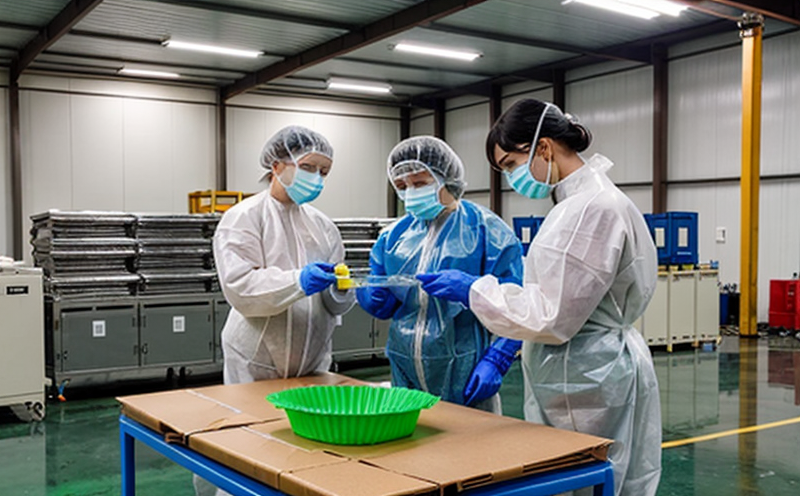ASTM D1894-14 Coefficient of Friction for Plastic Films
The ASTM D1894-14 test method is a critical standard used to measure the coefficient of friction (COF) between two surfaces, specifically plastic films. This test is essential in determining the slip resistance properties of various plastic packaging materials. The COF value provides insight into how easily one surface can slide over another and plays a key role in ensuring product safety, functionality, and consumer satisfaction.
The coefficient of friction is defined as the ratio of the force of friction between two surfaces to the normal force pressing them together. For plastic films used in packaging applications, this value is crucial for several reasons:
- Enhanced Handling: Proper COF ensures that products can be easily handled without slipping or sliding during manufacturing and distribution.
- Safety: In food packaging, a suitable slip resistance minimizes the risk of accidents by preventing slips and falls.
- Presentation: Packaging with an optimal COF enhances visual appeal when stacked on store shelves.
The ASTM D1894-14 test involves measuring the static and kinetic friction between a sliding disk made from the plastic film sample and a horizontal surface. The sample is conditioned to ensure it reaches equilibrium moisture content before testing, which ensures accurate results. The apparatus used includes a specially designed instrument capable of applying controlled loads and measuring the opposing forces during both static and dynamic conditions.
After conducting the test, the laboratory reports the coefficient of friction values for both static and kinetic modes. These measurements are then compared against industry standards to ensure compliance with regulatory requirements. Compliance is essential not only in maintaining product integrity but also in avoiding potential legal issues associated with non-compliance.
The importance of this test cannot be overstated, especially given the wide range of plastic packaging materials used across various industries such as food, pharmaceuticals, and consumer goods. In sectors like healthcare, where safety is paramount, accurate COF measurements help ensure that products are handled safely by medical professionals. For e-commerce businesses, understanding the COF can optimize warehouse operations, reduce material handling costs, and improve customer satisfaction.
The ASTM D1894-14 test is not just a technical exercise; it plays a vital role in ensuring product performance across different environments and uses. By accurately measuring the COF of plastic films, laboratories like ours contribute significantly to maintaining quality standards that are critical for both producers and consumers.
Why It Matters
The measurement of coefficient of friction (COF) is significant in the packaging industry because it directly impacts product performance. COF affects how easily products can be handled, stored, and transported without causing damage or safety hazards. For plastic films used in packaging applications, this value is particularly critical for ensuring that the film behaves as expected under various conditions.
In consumer goods packaging, a high coefficient of friction could lead to difficulty in opening packages, which might frustrate consumers. Conversely, too low COF values can result in products sliding off shelves or during handling processes, leading to waste and increased costs. In industrial applications, such as palletizing and unloading operations, an appropriate COF ensures that materials are handled efficiently without causing damage.
The ASTM D1894-14 test helps manufacturers ensure consistent quality by providing a standardized method for measuring the COF of plastic films. This consistency is crucial in maintaining brand reputation and consumer trust. By adhering to this standard, businesses can demonstrate their commitment to quality and compliance with industry best practices.
Moreover, the results from ASTM D1894-14 testing are often used during product development phases to refine formulations and improve performance characteristics. This iterative process ensures that products meet not only current standards but also anticipate future regulatory changes or market demands.
In summary, measuring COF through ASTM D1894-14 is essential for maintaining operational efficiency, ensuring safety, enhancing consumer satisfaction, and upholding high-quality standards in the packaging industry. This testing method provides valuable insights that contribute to better product design and manufacturing processes.
Applied Standards
| Standard Name | Description |
|---|---|
| ASTM D1894-14 | This standard specifies the test methods for determining the static and kinetic coefficients of friction between a sliding disk made from plastic film and a horizontal surface. |
| ISO 20372:2015 | An international equivalent that provides similar procedures but with additional considerations for specific materials like polyethylene terephthalate (PET). |
| EN ISO 9283-1:2016 | This European standard offers guidance on testing the slip resistance of floor coverings, which can be applied analogously to plastic films used in packaging. |
| IEC 60474-6:2009 | A related standard that deals with electrical resistivity and surface conductivity for solid insulating materials. While not directly relevant, it underscores the importance of material properties in ensuring safe handling. |
The application of these standards ensures that plastic packaging films meet rigorous quality benchmarks. By aligning testing protocols with recognized international guidelines, manufacturers can ensure their products are reliable and safe for end-users.
Benefits
Conducting ASTM D1894-14 tests offers numerous benefits across various aspects of the packaging industry:
- Quality Assurance: Ensures consistent product quality by providing a standardized method for measuring COF.
- Regulatory Compliance: Helps meet regulatory requirements, reducing the risk of non-compliance penalties and legal issues.
- Better Product Design: Provides valuable data that can be used to refine product formulations and improve performance characteristics during development phases.
- Increase Efficiency: Improves operational efficiency by ensuring proper handling conditions during manufacturing, storage, and transportation processes.
- Safety: Enhances safety for both producers and end-users by minimizing the risk of accidents or injuries related to slip hazards in packaging operations.
- Consumer Satisfaction: Ensures products are handled easily and safely, enhancing overall customer satisfaction and trust.
The benefits extend beyond just internal processes; they also contribute positively towards sustainable practices by optimizing material usage and reducing waste. By investing in ASTM D1894-14 testing, businesses can gain a competitive edge while contributing to higher standards of quality and safety.





